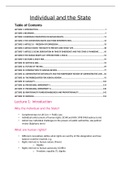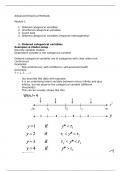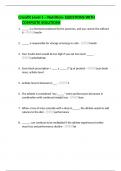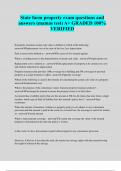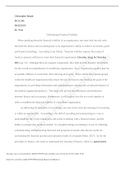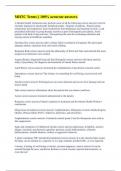Core Pure Mistakes Collection
Complex Numbers and Loci
Mistakes
1 2+𝑖
- If need express in the form of 𝑥 + 𝑦𝑖 , best to express fraction separately (1 + 𝑖 but not
2 2
1
nor 2 𝑖 + 1)
- In anytime, when face any problem just attempt to compare the real and imaginary part
- When finding intersection coordinates of the loci (circle and line) try in the form of
𝑟(𝑐𝑜𝑠(𝑥) + 𝑖𝑠𝑖𝑛𝑥) (not 𝑠𝑖𝑛𝑥 + 𝑖𝑐𝑜𝑠𝑥)
- If the 𝑎𝑟𝑔(𝑥) needs to go up, draw a line and label the angle with a changed x axis (goes up
too)
- If just 𝑎𝑟𝑔(𝑍) the line drawn only half and start at the origin
- For line equation, you could express in 𝑎𝑟𝑔(𝑥(𝑐𝑜𝑜𝑟𝑑𝑖𝑛𝑎𝑡𝑒𝑠)) = 𝜃
- If there is transformations, find the coordinates before transformation (when centre is origin)
then do the transformation
- If really don’t know how to find intersection, go to cartesian equation and solve
1
- when considering 𝑡𝑎𝑛𝑥 , you separate them to 𝑠𝑖𝑛𝑥 and 𝑐𝑜𝑠𝑥 then use 𝑍 ± 𝑍 to do
o or divide the variables with 𝑐𝑜𝑠𝑥, 𝑐𝑜𝑠𝑥 give one and 𝑠𝑖𝑛𝑥 give 𝑡𝑎𝑛𝑥
- For geometric sequence, n represents the number of terms, if from 1-10, then 10 terms, if 0-
10, then 11 terms, n=11
- Can use the exponential for rotation of a point
- The range of the roots should be between 𝜋 and −𝜋 but not 0 to 2𝜋, unless specified
2𝜋
- To obtain the exact value, cannot use the 𝑐𝑜𝑠(𝑥 + 3 ) form as cannot find,
2𝜋
𝑖( )
o first convert the 𝑒 3 to complex number
1 3
o then multiply to the old one (𝑥 + 𝑖𝑦)(− + √ )
2 2
- When struggling on proving exact value of 𝑐𝑜𝑠(𝑘), try to do binomial expansion
- Remember the complex number answer structure
o (see PMT CP2 Complex number Q7),
o take care Q10 bi too
- When proving zz* is real number, state that as both numbers are real (in the result) to secure
the last mark
𝜋
- For half line, use the expression arg(𝑧 − 2) = 4 too, not |𝑍 − 𝑍1 | = |𝑍 − 𝑍2 | format
- Don’t think too much, when ask the intersection of two curves in set notation, no need to use
in equality
- For proving 𝜔4 + 𝜔3 + 𝜔2 + 𝜔 = −1 in 𝑧 5 = 1
o Simply factorisation
- Argand diagram, remember to state coordinates/ complex numbers
, - Finding square root, not only can use modulus argument form, also can use (𝑥 + 𝑦𝑖)2 = 9 +
40𝑖 then compare coefficients
Sketching
Need to look about whether the circle passes some points (length between origin to the centre=
radius? the centre equal radius (in terms of the coordinates))
Remember this diagram
• They are points not lines
Show that the shape is a regular polygon
- The distance between point K and point K-1 has magnitude W= 1
- At each point K, the exterior angle is the difference between the argument of WK and W(K-
2𝜋
1), which is so the exterior angles are the same
𝑛(𝑡ℎ𝑒 𝑛𝑢𝑚𝑏𝑒𝑟)
- Hence it is a regular polygon (or the specific name)
Deriving sin (𝑛𝑘) to power form or vice versa
- use excess expansion (𝑐𝑜𝑠𝑥 + 𝑖𝑠𝑖𝑛𝑥) and take the real part/ imaginary part
1
- or use Demorive's theorem to expand or the 2𝑐𝑜𝑠𝑥 = 𝑍 + 𝑍 and expand
Geometric series of 𝐶 + 𝑖𝑆
- separate them to get 𝑠𝑖𝑛𝜃, 𝑐𝑜𝑠𝜃
1
- If it is 1−𝑒 𝑖𝜃 then multiply by the half negative theta (force factorisation),
- 1 − 𝑒 −𝑖𝜃 (Z*), depending on the question, see what is the expression
To get 𝑠𝑖𝑛𝑥, we need to divide by 2i not just only 2
Series
Mistakes
• Use arrows (e.g. 𝑛 → 2𝑛 + 1 instead of 𝑛 = 2𝑛 + 1)
• The Standard Maclaurin series could be found in the formula book, do not derive unless specified
• For the number with binomial and 𝑒 𝑥 just do Maclaurin by just differentiating
Complex Numbers and Loci
Mistakes
1 2+𝑖
- If need express in the form of 𝑥 + 𝑦𝑖 , best to express fraction separately (1 + 𝑖 but not
2 2
1
nor 2 𝑖 + 1)
- In anytime, when face any problem just attempt to compare the real and imaginary part
- When finding intersection coordinates of the loci (circle and line) try in the form of
𝑟(𝑐𝑜𝑠(𝑥) + 𝑖𝑠𝑖𝑛𝑥) (not 𝑠𝑖𝑛𝑥 + 𝑖𝑐𝑜𝑠𝑥)
- If the 𝑎𝑟𝑔(𝑥) needs to go up, draw a line and label the angle with a changed x axis (goes up
too)
- If just 𝑎𝑟𝑔(𝑍) the line drawn only half and start at the origin
- For line equation, you could express in 𝑎𝑟𝑔(𝑥(𝑐𝑜𝑜𝑟𝑑𝑖𝑛𝑎𝑡𝑒𝑠)) = 𝜃
- If there is transformations, find the coordinates before transformation (when centre is origin)
then do the transformation
- If really don’t know how to find intersection, go to cartesian equation and solve
1
- when considering 𝑡𝑎𝑛𝑥 , you separate them to 𝑠𝑖𝑛𝑥 and 𝑐𝑜𝑠𝑥 then use 𝑍 ± 𝑍 to do
o or divide the variables with 𝑐𝑜𝑠𝑥, 𝑐𝑜𝑠𝑥 give one and 𝑠𝑖𝑛𝑥 give 𝑡𝑎𝑛𝑥
- For geometric sequence, n represents the number of terms, if from 1-10, then 10 terms, if 0-
10, then 11 terms, n=11
- Can use the exponential for rotation of a point
- The range of the roots should be between 𝜋 and −𝜋 but not 0 to 2𝜋, unless specified
2𝜋
- To obtain the exact value, cannot use the 𝑐𝑜𝑠(𝑥 + 3 ) form as cannot find,
2𝜋
𝑖( )
o first convert the 𝑒 3 to complex number
1 3
o then multiply to the old one (𝑥 + 𝑖𝑦)(− + √ )
2 2
- When struggling on proving exact value of 𝑐𝑜𝑠(𝑘), try to do binomial expansion
- Remember the complex number answer structure
o (see PMT CP2 Complex number Q7),
o take care Q10 bi too
- When proving zz* is real number, state that as both numbers are real (in the result) to secure
the last mark
𝜋
- For half line, use the expression arg(𝑧 − 2) = 4 too, not |𝑍 − 𝑍1 | = |𝑍 − 𝑍2 | format
- Don’t think too much, when ask the intersection of two curves in set notation, no need to use
in equality
- For proving 𝜔4 + 𝜔3 + 𝜔2 + 𝜔 = −1 in 𝑧 5 = 1
o Simply factorisation
- Argand diagram, remember to state coordinates/ complex numbers
, - Finding square root, not only can use modulus argument form, also can use (𝑥 + 𝑦𝑖)2 = 9 +
40𝑖 then compare coefficients
Sketching
Need to look about whether the circle passes some points (length between origin to the centre=
radius? the centre equal radius (in terms of the coordinates))
Remember this diagram
• They are points not lines
Show that the shape is a regular polygon
- The distance between point K and point K-1 has magnitude W= 1
- At each point K, the exterior angle is the difference between the argument of WK and W(K-
2𝜋
1), which is so the exterior angles are the same
𝑛(𝑡ℎ𝑒 𝑛𝑢𝑚𝑏𝑒𝑟)
- Hence it is a regular polygon (or the specific name)
Deriving sin (𝑛𝑘) to power form or vice versa
- use excess expansion (𝑐𝑜𝑠𝑥 + 𝑖𝑠𝑖𝑛𝑥) and take the real part/ imaginary part
1
- or use Demorive's theorem to expand or the 2𝑐𝑜𝑠𝑥 = 𝑍 + 𝑍 and expand
Geometric series of 𝐶 + 𝑖𝑆
- separate them to get 𝑠𝑖𝑛𝜃, 𝑐𝑜𝑠𝜃
1
- If it is 1−𝑒 𝑖𝜃 then multiply by the half negative theta (force factorisation),
- 1 − 𝑒 −𝑖𝜃 (Z*), depending on the question, see what is the expression
To get 𝑠𝑖𝑛𝑥, we need to divide by 2i not just only 2
Series
Mistakes
• Use arrows (e.g. 𝑛 → 2𝑛 + 1 instead of 𝑛 = 2𝑛 + 1)
• The Standard Maclaurin series could be found in the formula book, do not derive unless specified
• For the number with binomial and 𝑒 𝑥 just do Maclaurin by just differentiating



